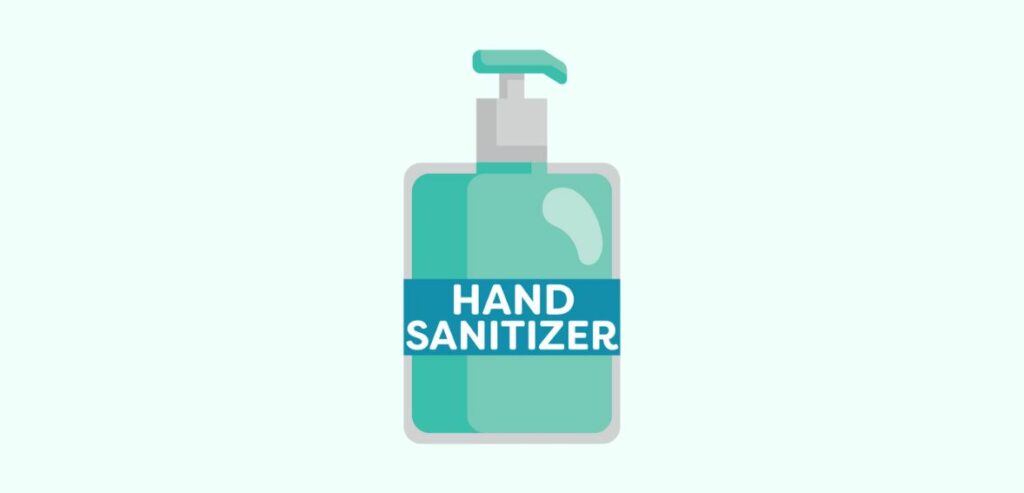One effective way that helped limit the spread of COVID-19, as well as other infectious diseases, was hand sanitizers. Sanitizers have since gained much popularity and have become a frequently used product in daily life. However, a recent nationwide recall of a hand sanitizer and a pain-relieving aloe gel has raised concerns after it was found that some of these products can lead to severe health issues such as seizures, coma, blindness, or even death.
This issue arose because harmful methanol was found in some hand sanitizers and aloe gels. Soon after, several batches of hand sanitizer and aloe gels were voluntarily pulled from the market.
Methanol can be harmful if it comes into contact with the skin or is ingested. Revealing one such case, the FDA said on April 5th that 40 batches of Aruba Aloe Alcoholada Gel and Aruba Aloe Hand Sanitizer Gel Alcohol 80% are subject to recall.
The products in question were dispatched from May 1, 2021, to October 27, 2023, and were accessible in the US through the Aruba Aloe Balm website. Following the news, the company has emailed all customers who purchased the recalled items to notify them of the recall and provide a discount coupon for future purchases.

Image source
FDA Warning: Adverse Effects of Hand Sanitizers and Recalled Products
Individuals exposed to certain hand sanitizers may experience a range of adverse effects, such as vomiting, nausea, blurred vision, headaches, seizures, comas, irreversible central nervous system damage, permanent blindness, or death.
The FDA highlights that these hand sanitizers pose dangers to individuals across all age groups. However, children are particularly susceptible, as they might accidentally consume these products. Additionally, adolescents and adults who use these sanitizers as an alternative to alcoholic beverages are at a heightened risk of suffering from methanol poisoning.
In a related action, the US FDA has issued a recall for another product by the same manufacturer, the Aruba Aloe Alcoholada Gel. This product, intended for external use to alleviate pain and itching from minor burns, sunburns, and insect bites, has also been deemed hazardous.
The FDA advises consumers possessing these recalled hand sanitizers and creams to dispose of them immediately. It also recommends those who have used the products and are experiencing skin irritation or other health issues to consult with a healthcare professional promptly. The US pharmaceutical regulator has issued a recall for 40 batches of Aruba Aloe Alcoholada Gel and Aruba Aloe Hand Sanitizer Gel Alcohol 80%. These products, which were available for purchase online in the US, were distributed from May 1, 2021, to October 27, 2023.
Methanol Exposure Risks and FDA Recommendations

Methanol, often called “wood alcohol,” is widely used in manufacturing varnishes, antifreeze, paints, and plastics and serves as fuel for ships and buses. This substance is highly toxic, and consuming a small amount, such as 30 milliliters, could be fatal for a child, while as little as 2 ounces could lead to death in an adult. Immediate medical action is critical to prevent mortality in such cases, which may include procedures like stomach pumping and dialysis to cleanse the kidneys.
The Centers for Disease Control and Prevention states that methanol can enter the body through breathing, swallowing, skin exposure, or getting it in the eyes. Consumption of methanol can lead to a variety of health issues, such as vomiting, nausea, dizziness, headaches, kidney failure, blurred vision, seizures, coma, irreversible blindness, lasting harm to the central nervous system, and even death.
The FDA advises consumers to cease using these products and safely dispose of them immediately. Additionally, individuals are encouraged to seek medical advice from a physician or healthcare provider if they have encountered any health issues potentially linked to these products. As of April, Aruba Aloe Balm N.V. has not reported adverse effects connected to these products. While anyone using these products on their hands faces risks, young children who might accidentally consume these products, as well as teenagers and adults using them as an alternative to alcohol (ethanol), are particularly vulnerable to the dangers of methanol poisoning.
The company advises consumers to contact their doctor or healthcare provider if they encounter any issues potentially linked to using this drug product. They also urge consumers to stop using the gels immediately and dispose of them properly. Customers are encouraged to contact the provider via email at [email protected] for inquiries regarding the recall. Additionally, any health-related concerns arising from these products should be reported to the FDA’s MedWatch Adverse Event Reporting program through an online form on the FDA’s website.
What Aruba Products Have Been Recalled?
Here are the products that the company has recalled:
- Aruba Aloe Hand Sanitizer Gel Alcohol 80%:
The Aruba Aloe Hand Sanitizer Gel is formulated with 80% alcohol and pure Aloe Vera Gel, which is harvested from the company’s own fields. This combination is designed to offer an effective sanitizing solution that helps reduce bacteria on the skin that could cause disease.
The use of pure aloe vera gel also aims to ensure that, alongside its sanitizing properties, the product is gentle on the skin, maintaining its moisture without causing dryness. This product is part of Aruba Aloe’s commitment to providing high-quality skincare solutions that harness the natural benefits of aloe vera.
- The Aruba Aloe Alcoholada Gel:
The Aruba Aloe Alcoholada Gel is an oil-free medicated product enriched with Lidocaine and Pure Aloe Vera Gel from Aruba. This specially formulated gel is designed to provide instant cooling and soothing relief for sunburns, insect bites, and muscle aches.
Pure Aloe Vera Gel not only helps soothe pain but also moisturizes the skin, making it suitable for use after exposure to the sun or alleviating discomfort from insect bites and sore muscles. It’s free from parabens, ensuring its suitability for sensitive skin types.
Here is a list of recalled Aruba Aloe Hand Sanitizer Gel (volume: 12 fl. oz):
| Lot Number | Date of Expiry |
| 24759 | March 4, 2024 |
| 25160 | April 16, 2024 |
| 25344 | May 20, 2024 |
| 25580 | June 15, 2024 |
| 25828 | July 28, 2024 |
| 26057 | August 25, 2024 |
| 26195 | September 18, 2024 |
| 26471 | November 25, 2024 |
| 26754 | January 20, 2025 |
| 26821 | February 2, 2025 |
| 27005 | March 11, 2025 |
| 27518 | June 22, 2025 |
| 27927 | August 26, 2025 |
| 28176 | October 22, 2025 |
| 28392 | December 31, 2025 |
Here is a list of recalled Aruba Aloe Alcoholada Gel (volumes: 2.2 and 8.5 fl. oz):
| Lot Number | Expiration Date | Available in 8.5 oz | Available in 2.2 oz |
| 25253 | May 1, 2024 | Yes | Yes |
| 25976 | August 11, 2024 | Yes | Yes |
| 26150 | September 11, 2024 | Yes | Yes |
| 26473 | November 25, 2024 | Yes | No |
| 26553 | December 11, 2024 | Yes | Yes |
| 26696 | January 8, 2025 | No | Yes |
| 27318 | May 10, 2025 | Yes | Yes |
| 27481 | June 15, 2025 | Yes | Yes |
| 27660 | July 15, 2025 | Yes | Yes |
| 27839 | August 5, 2025 | Yes | Yes |
| 28121 | October 7, 2025 | Yes | No |
| 28152 | October 18, 2025 | Yes | No |
| 28281 | November 30, 2025 | No | Yes |
| 28355 | December 17, 2025 | Yes | Yes |
| 28761 | February 22, 2026 | Yes | Yes |
| 29088 | April 1, 2026 | Yes | Yes |
| 29510 | May 11, 2026 | Yes | No |
| 29558 | May 13, 2026 | Yes | No |
| 29728 | June 3, 2026 | Yes | Yes |
| 30086 | July 26, 2026 | No | Yes |
| 30339 | September 13, 2026 | Yes | Yes |
| 30563 | October 27, 2026 | Yes | Yes |
Guidelines for Identifying Hand Sanitizers to Avoid

Suppose you want to determine whether a particular Aruba product or any other product suits you. In that case, you can visit the official website of the US Food and Drug Administration. By matching the relevant details, you can determine whether you should avoid a specific product or not:
- NDC number: Look for the National Drug Code (NDC) number, typically found on the product’s label.
- Lot Number: You should also look for the lot number, which identifies a particular batch of the product and can be helpful in case of any concerns or issues with that batch.
- Distributor details: Check for the names of distributors who have marketed or intended to market the hand sanitizers made by these manufacturers.
- Manufacturer’s name: Verify the manufacturer details provided.
- Manufacturer verification: If the manufacturer’s name is absent on the label, contact the distributor for this information. If the distributor does not disclose the manufacturer upon request, the FDA advises against using the product.
It’s important to note that a distributor may source hand sanitizers from multiple manufacturers, even if the products share the same brand name. Therefore, the FDA’s advice against using a product from a specific manufacturer doesn’t automatically apply to all products associated with the distributor’s brand or other items the distributor sells.
FDA Guidelines and Safety Tips for Hand Sanitizer Use
In light of the recall, it’s crucial to understand the safety and effectiveness of hand sanitizers, as outlined by the FDA. The FDA emphasizes that hand sanitizers are classified as over-the-counter (OTC) drugs, subject to rigorous safety and effectiveness guidelines. Following a comprehensive review, the FDA has determined that certain active ingredients cannot be included in OTC hand sanitizers, ensuring that consumers are protected from potentially harmful substances.
The primary active ingredients currently under review for their safety and effectiveness in hand sanitizers include ethyl alcohol, isopropyl alcohol, and benzalkonium chloride. The FDA has called for further research into these ingredients to confirm their safety for regular use. This initiative reflects the FDA’s commitment to safeguarding public health by requiring that hand sanitizers on the market are safe and effective for consumer use.
Safety Tips for Consumers:
- Hand sanitizers should contain at least 60% alcohol to be effective.
- Use hand sanitizer properly by covering all surfaces of your hands and rubbing them together until they feel dry.
- If your hands are oily or filthy, wash them with soap and water instead of hand sanitizer.
- Store hand sanitizer out of reach of children and supervise their use.
- Avoid hand sanitizers packaged in containers that resemble food or drink bottles to prevent accidental ingestion, which can be particularly dangerous for children.
The FDA also maintains a list of hand sanitizers that consumers should not use, which includes products contaminated with toxic alcohol or those that do not meet the required alcohol content. To enhance the FDA’s monitoring and regulation, consumers and healthcare professionals are encouraged to report any adverse effects related to hand sanitizer products.
Conclusion
The recent recall of hand sanitizer and aloe gel products has highlighted the critical importance of product safety and the need for vigilant consumer awareness. The FDA and manufacturer, Aruba Aloe Balm N.V., have taken swift action after detecting the presence of methanol, a highly toxic substance, in various batches of these products. Methanol exposure poses a severe threat to human health, including the risk of coma, seizures, blindness, and even death.
In light of this, consumers need to heed the FDA’s warnings, discontinue the use of the recalled items, and dispose of them safely. Moreover, if anyone experiences any adverse effects, they must seek medical attention promptly. This incident underscores the need for thorough product scrutiny and strict adherence to FDA guidelines to ensure public health and safety. After the pandemic what was once a necessity now has become more of a lifestyle choice.
Frequently Asked Questions
Is applying surface cleaners and disinfectants on my hands or body safe?
No, it's unsafe. These products are formulated for cleaning surfaces and can irritate the skin and eyes. Always use them as directed and not on your body.
What should I do if hand sanitizer irritates my skin?
If a hand sanitizer causes a serious skin reaction, contact your doctor or the Poison Helpline at 1-800-222-1222 immediately, providing details like the product name and manufacturer.
How do hand sanitizers compare to washing hands?
Hand sanitizers kill germs on the skin with alcohol, while hand washing physically removes them and chemicals. Soap and water are more universally effective against a wider range of substances.
When and how should I use hand sanitizer?
Use hand sanitizer when soap and water aren't available, ensuring it contains at least 60% alcohol. Cover all surfaces of your hands and rub them until dry for about 20 seconds without rinsing off the product.

